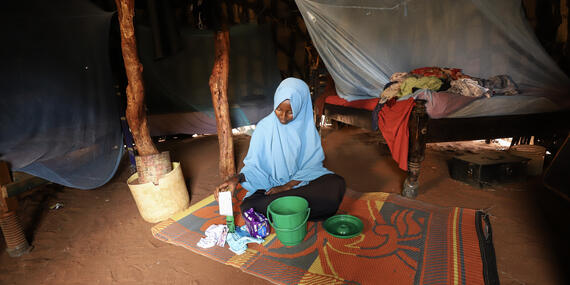Local partner’s efforts in “keeping a girl in school.”

By Milka Ndungu
It’s the twenty-first century, but some girls still have to put their lives on hold during their menstrual cycle because they cannot afford sanitary products. One of those girls was 14-year-old Khadija, from Alungu Village, Lafey subcounty, in Kenya’s Mandera County. She recalls using a piece of cloth when she first experienced her monthly period, as it was the only alternative her mother could afford.
Khadija explained: “I felt disgraced to be a girl, and it felt like it was a curse from Allah. I was so scared and helpless. I will never forget that experience."
A UNESCO study found that one in 10 girls in sub-Saharan Africa missed school while on their period. In Kenya, it is estimated that girls lose an average of four days of school a month, which costs them 165 learning days over four years of high school.
To help resolve this situation, the Nomadic Assistance for Peace and Development, in partnership with Oxfam Kenya and the Arid and Semi-Arid Lands Humanitarian Network, launched an initiative to provide adolescent girls with dignity kits (hygiene and sanitary items) to ensure proper menstrual hygiene management. The dignity kits are also a step towards girl-child empowerment, and a way to help prevent girls being sexually exploited for money to buy sanitary towels, which could lead to teenage pregnancies and school dropouts for early marriages.
The initiative helped Khadija and around 400 school-going adolescent girls in Wajir and Mandera counties to navigate their monthly periods effortlessly with dignity kits and menstrual hygiene information from female community health workers. It also enables communities to hold open conversations about menstrual and reproductive health and eliminate the stigma associated with menstruation.
The project started during the 2022-2023 drought and helped to keep girls in school. Families' livelihoods were depleted at that time, and parents prioritized buying food over sanitary towels with the little resources they had.

Empowering girls
When girls are empowered, they can focus and perform well in school as they attend classes throughout the month. Khadija can now go to school with confidence, even during her period. “I can now concentrate in class. I find no reason to miss school during my periods. I can confidently stand in front of my classmates, and I can do all of this without worrying about my period,” she says confidently.
Hafsa also benefited from the initiative. She explains: “Since we received the dignity kits, I no longer miss school. Even when I am on my period, nobody knows because they trained us on how to use the pads and clean ourselves right after. I no longer feel shame about being on my period.”
Khadija and Hafsa are now peer educators who teach their friends the importance of maintaining good hygiene and how to use sanitary pads. They also break down myths and misconceptions about menstruation.
“I have now taken it upon myself to help other girls in my Duksi [Islamic schooling] experiencing their first menstrual period,” Khadija says. “Now I know that there is no need to be ashamed of it.”
The initiative also provided 100 vulnerable families with water, sanitation and hygiene assistance, and community health promoters are engaging with the public through door-to-door campaigns on hygiene and sanitation. However, more funding is required to continue providing assistance.
